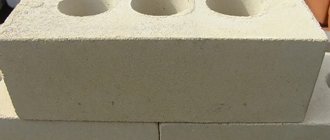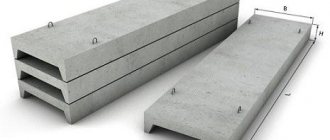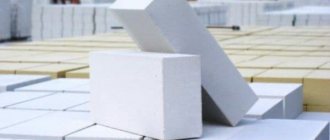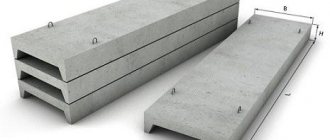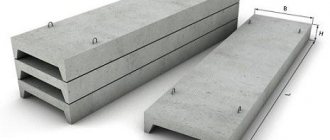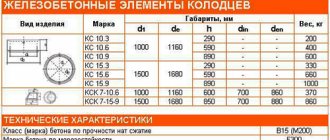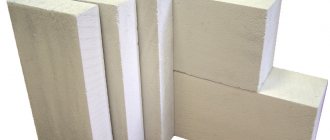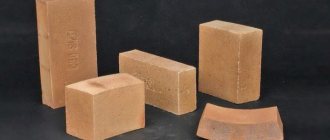Figure 1 — Appearance of FBS blocks
Solid foundation blocks (FBS) are reinforced concrete products, they are part of the foundation that distribute the load on the base.
The blocks provide the ability to perform quick installation and are less susceptible to the influence of external factors compared to a monolithic foundation. Blocks for foundations and walls have:
- strength;
- wear resistance;
- long service life.
To learn in detail about the dimensions and weight of FBS blocks, learn to decipher the markings and understand how foundation blocks are laid, we recommend that you read the publication in full or go to the section that interests you.
Manufacturing technology
FBS are manufactured in the shape of a parallelepiped. For production can be used:
- heavy concrete;
- expanded clay concrete;
- medium density silicate concrete.
Concrete blocks are not reinforced. Various technologies are used to produce concrete blocks for the foundation, the most common are:
- natural drying (100% strength is achieved on day 28);
- steaming (forced drying to obtain 100% strength in a short time. A block located in the steaming chamber for a day acquires strength from 70% and above).
The most important ingredient in a block is high-quality concrete. The end part of the FBS has grooves that are filled with mortar during installation work.
Figure 2 - Form for filling
The block manufacturing process is as follows:
- Prepare a concrete mixture using cement, aggregate and water (the solution is mixed using the blades of a forced-type mortar mixer).
- Load the solution into the block mold (manually or using a pneumatic concrete pump).
- Compact the solution (a deep vibrator is used to compact the solution). The concrete compaction process takes a few minutes.
- Remove the finished blocks after 24 hours (removal occurs earlier if hardening accelerators are used).
Advantages
FBS can be installed in any climatic conditions. This material has an affordable price and does not deform even under strong mechanical loads. In general, this concrete block can last more than 60 years if installed correctly and not lose its performance throughout its entire service life.
Factory-made building materials have a number of advantages over handicraft products. At the factory it is produced by vibration pressing from durable concrete, resulting in a durable building material. Our company cooperates only with well-known manufacturers of building materials, who pay special attention to the quality of their products.
At Partner LLC, you can buy concrete blocks at the manufacturer’s price with fast delivery to the construction site in Moscow and the region. We guarantee excellent product quality, low prices and provide a choice of products from several manufacturers. In our catalog you can find out how much this or that product costs and choose the appropriate product by weight. From us you can buy blocks measuring 400x600x2400, the weight of which is ideal for individual and industrial construction, as well as blocks of other sizes and weights for any purpose.
Types and markings
Reinforced concrete products are manufactured in accordance with GOST 13579-78. They are:
- FBS - solid;
- FBP - hollow;
- FBV - solid with a cutout (designed for passing communications under the ceiling and laying jumpers).
Table 1 - Main dimensions of foundation blocks
| Block type | Length, mm | Width, mm | Height, mm |
| FBS | 2380 | 300; 400; 500; 600 | 580 |
| 1180 | 400; 500; 600 | 280; 580 | |
| 880 | 300; 400; 500; 600 | 580 | |
| FBV | 880 | 400; 500; 600 | 580 |
| FBP | 2380 | 400; 500; 600 | 580 |
Figure 3 — Structure of block marking symbols
Using an example, consider a block marked FBS-12-Z-6t. When marking, decimeters are used, so the decoding of the marking sounds like this: FBS is a solid block, 1180 mm long, 300 mm wide, 600 mm high, made of heavy concrete.
The letter designations at the end of the brand are deciphered:
- t - heavy concrete;
- n - on porous aggregates (expanded clay concrete);
- c - dense silicate.
In addition to markings, stamps of the manufacturer (including quality control department) are indicated on the block. Pay attention to this when purchasing.
Purpose of foundation blocks
Reinforced concrete blocks create a reliable and strong connection and increase the tightness of the structure. A wide range of applications and low price allow the use of FBS 400x600x2400 in construction and installation work of any complexity. Using these heavy weight foundation blocks, multi-storey buildings, non-residential buildings, technical buildings and fences are erected. This building material is well suited for the construction of industrial buildings and the creation of artificial barriers, as well as ramps and various temporary structures. It can be used to construct garages, commercial buildings and residential buildings.
Thanks to heat treatment, this foundation building material has increased resistance to moisture, frost and temperature changes. Due to its impressive dimensions, weight and shape, the installation of FBS is facilitated. Therefore, construction work can continue without waiting for the mortar to set. This creates economic benefits in large-scale construction and reduces the construction time of any buildings and structures.
FBS 400x600x2400 is heavy and requires special equipment to be brought to the construction site for unloading and installation. The large size of reinforced concrete products increases the speed of installation work on the construction of the foundation. On the modern construction market you can find a foundation block based on expanded clay concrete, which has less weight and price than its analogues.
Specifications
Figure 4 - Dimensions of the FBS concrete block
These products must:
- Made from compressive strength concrete class B7.5 (concrete grade M100) or B12.5 (concrete grade M150). It is possible to produce blocks from concrete with a compressive strength class that differs from that presented in Table 2. For heavy concrete, the indicators are no less than B3.5 (M50) and no more than B15 (M200).
- Be frost-resistant (F50).
- Be waterproof (W2).
- Be dense (2200 - 2500 kg/m3, heavy concrete).
Table 2 - Technical specifications
| Block brand | Concrete class by compressive strength | Consumption of materials | Block weight (average density 2400 kg/m3), t | |
| Concrete, cubic meters | Steel, kg | |||
| FBS24.3.6-T | B7.5 | 0,406 | 1,46 | 0,97 |
| FBS24.4.6-T | B7.5 | 0,543 | 1,46 | 1,30 |
| FBS24.5.6-T | B7.5 | 0,679 | 2,36 | 1,63 |
| FBS24.3.6-T | B7.5 | 0,815 | 2,36 | 1,96 |
| FBS12.4.6-T | B7.5 | 0,265 | 1,46 | 0,64 |
| FBS12.5.6-T | B7.5 | 0,331 | 1,46 | 0,79 |
| FBS12.6.6-T | B7.5 | 0,398 | 1,46 | 0,96 |
| FBS12.4.3-T | B7.5 | 0,127 | 0,74 | 0,31 |
| FBS12.5.3-T | B7.5 | 0,159 | 0,74 | 0,38 |
| FBS12.6.3-T | B7.5 | 0,191 | 0,74 | 0,46 |
| FBS9.3.6-T | B7.5 | 0,146 | 0,76 | 0,35 |
| FBS9.4.6-T | B7.5 | 0,195 | 0,76 | 0,47 |
| FBS9.5.6-T | B7.5 | 0,244 | 0,76 | 0,59 |
| FBS9.6.6-T | B7.5 | 0,293 | 1,46 | 0,70 |
Step-by-step instructions for laying the foundation
To begin laying concrete blocks for the foundation, dig a pit (trench). To ensure that installation does not cause inconvenience, it is important to find out the dimensions of the FBS blocks (Table 1) and dig a wider trench. The bottom is cleared of rock, irregularities are smoothed out, and the base is filled with sand. In sandy soil it is not advisable to do this work. In order for the laying of a concrete block foundation to be successful, it is necessary to prepare the foundation.
Preparing the base
Figure 5 - Concrete block foundation
For a sand base you will need a wooden beam, 50 - 100 mm in height. Make the sand embankment 200 mm wider than the base of the foundation. After installing the wooden beam (be sure to check the evenness of the surface), moistened sand must be poured inside the frame and compacted.
To increase the base area, the initial row is laid wider than the main part (you can use FL foundation slabs or fill the base with a monolithic strip foundation).
The gap between laying slabs can reach 700 mm. Next, lay the first row of FBS in such a way that the seams located vertically are above the pillows.
Laying blocks
To begin installing a foundation made of FBS blocks, you need to understand how to lay the blocks. Installation work begins with marking. The stakes are installed according to the drawing, and the thread is pulled along them. To make laying the row easier, first place the blocks at the corners and intersections. Fill the vertical seams with mortar or tamp down as much as possible with earth. The space between the blocks that appears during installation is filled with concrete and leveled until a monolithic insert is formed between the blocks.
The layer of mortar between the top and bottom rows must be at least 15 mm. Vertical seams are tied with a layer of concrete 250 - 600 mm. To strengthen the dressing between the rows, use reinforcement. During laying, do not forget to make a hole for the sewer pipes.
Sizes and prices
Depending on the size of FBS blocks, manufacturer and region, the price may vary.
For example, an FBS block with dimensions 880 x 300 x 580 FSK "Tores" in the city of Ufa costs 655 rubles per piece, and in Moscow it offers the same product for 843 rubles.
per piece Table 3 - Dimensions and average price per piece in Moscow
| FBS 4-3-3 | 358 rub. |
| FBS 4-3-6 | 612 rub. |
| FBS 6-3-6 | 863 rub. |
| FBS 6-4-3 | 848 rub. |
| FBS 9-3-6 | 640 rub. |
| FBS 9-4-3 | 831 rub. |
| FBS 12-6-3 | 836 rub. |
| FBS 12-6-6 | RUB 1,742 |
| FBS 24-5-3 | RUB 2,253 |
| FBS 24-5-5 | RUB 2,612 |
Figure 6 - Appearance of a reinforced concrete product for a foundation 200 x 200 x 400
Foundation block 200 x 200 x 400, the price of which is 55 rubles. per piece, is not a type of FBS blocks. It is made of concrete grade M100 and has a frost resistance rating of F50. But due to its small size, experienced builders do not recommend using it at the base of the foundation.
The advantage of foundation blocks 200 x 200 x 400, the price of which is pleasing to the eye, is the ability to lay the foundation in places inaccessible to vehicle access. The weight of one block is in the range of 30 - 35 kg, and for a one-story building (cottage, bathhouse, barn), concrete blocks for a foundation of this size are just right.
If you are already registered, enter your login information!
Next article
Description of foundation blocks FBS 24-4-6
Foundation blocks are a piece of building material with which you can quickly assemble a reliable and durable foundation for any building, lay down the basement and basement, and the walls of an underground structure. One of the most popular types is FBS 24-4-6. More often they are made of heavy concrete, but GOST 13579-78 also allows for the production of prefabricated foundation elements from dense silicate or with the addition of expanded clay.
Characteristics and Features
Main types:
- To produce FBS 24-4-6, heavy concrete of classes B7.5-B12.5 with a density of 2300-2500 kg/m3 must be used, but today plants also offer stronger blocks - up to B22.5. Products traditionally come with internal reinforcement and sling loops. As a result, the weight reaches 1300 kg. All elements are marked with the letter “t” or simply come with numeric indices by default.
- Expanded clay blocks (denoted by the letter “p” at the end of the entry) have the same strength indicators, but due to the lighter porous filler, their weight usually does not exceed 980 kg.
- Products made from compacted silicate concrete with a density of 2000 kg/m3 ended up somewhere in the middle - 1.09 tons. At the same time, the compression class of the material here is quite high (B15-B20).
Foundation blocks at all factories are produced using approximately the same technology. The only difference can be in the chosen method of hardening the fill. There are two options: natural drying for the required 28 days or steaming. In the second case, FBS gains up to 70% of the standard strength within 24 hours, and then hydration occurs under normal conditions while maintaining the required level of humidity in the concrete.
Check the date and method of production of the batch or ask the seller how many days the concrete products were left to gain strength. According to GOST, all products can go on sale as soon as their compression resistance reaches 50% of the declared values. The exception is heavy blocks, starting from class B12.5 - they must have time to purchase 70%, and silicate concrete - all 100.
FBS 2400x600x400 foundation blocks can be made from different materials. But since heavy reinforced concrete products remain the most common, we will consider the characteristics only for them:
- The weight of one block with a volume of 0.552 m3 is 1270-1300 kg.
- Compressive strength – 100-350 kgf/cm2 (it is possible to manufacture lighter products of class not lower than B3.5, that is, with a load-bearing capacity of 50 kgf/cm2).
- Water resistance – W2-W4.
- Frost resistance – F50-F100.
- Operating temperature range -70 – +50 °C.
- The weight of the fittings is 1.46 kg.
The standard size of blocks is not 2400x600x400 mm, but 2380x580x400 - in the marking the values are rounded to the nearest decimeter. GOST also allows an error in length within ±13 mm, in height/width – up to ±8 mm. Therefore, the gap between the actual and declared dimensions sometimes increases or approaches the nominal values.
From manufacturers you can buy foundation wall blocks with different quality side surfaces: for painting (category A3), tiling (A5) or without any further finishing (A6 and A7). Special grooves are always left on the “butt” side, into which cement mortar is placed during installation.
Application
Most often, 24-4-6 blocks are used for the construction of prefabricated strip foundations. If there is special equipment and the possibility of its access to the site, this technology allows you to complete the zero cycle faster than when pouring a monolith into formwork and waiting for it to mature. This is a good solution if work is carried out in moisture-saturated soils, since ready-made concrete products are sufficiently waterproof.
Dimensions 2400x600x400 mm allow you to get a tape of standard width. This is sufficient for shallow foundations and interior walls of basements, as well as for light buildings. But in the case of load-bearing structures and if it is necessary to fill a wide tape, it is better to choose FBS 24-6-6. The length also turns out to be convenient for the construction of any objects. With dimensions of 2.4 m it is possible to obtain a minimum number of vertical seams.
Foundation wall blocks are used not only for the construction of foundations - they are suitable for the construction of any underground structures and technical premises. Their high characteristics make it possible to use FBS as a material for the construction of unheated industrial facilities, road and site fencing. The only restriction on the use of blocks is related only to the seismicity of the site - it should not exceed 8 points.
Block cost
| Manufacturer (supplier) | Concrete grade | Price per piece, rubles | Cost with delivery |
| BetonMix | M350 | 1900 | 2600 |
| DSK-Stolitsa | M300 | 2400 | 3000 |
| BetMet Trade | M300 | 2700 | 3500 |
| ZhBI-Center | M250 | 1700 | 1900 |
| Concrete goods 24/7 | M300 | 2100 | payment for the flight |
| RusGradStroy | M300 | 2250 |
Other types of FBS are more difficult to purchase; they are manufactured in small batches to order.
- Expanded clay block with dimensions 2400x600x400 mm can be purchased for 1680.
- Silicate 24-4-6c for the foundation will cost 100 rubles more.
Used products are usually not inferior in price and quality to new ones. Blocks for reuse can be found for 1300-1700 rubles. The main thing is that there are no large cracks or exposed reinforcement on the surface. For such reinforced concrete products, deviations in dimensions from standard ones are not standardized. And if width matters, it is better to take FBS 24-6-6 - there will be enough stock so that possible chips will not create problems during subsequent construction.
Next article
